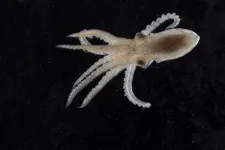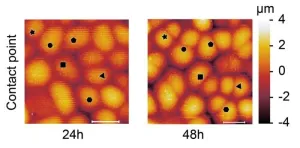(Press-News.org) By Wynne Parry
Laden with dissolved salt, Antarctic waters can hover just above freezing and even dip below it. Temperatures this low would likely kill the animals that prosper in warmer waters further north. Yet, some creatures have found ways to live in this inhospitable cold.
In a new study described in Proceedings of the National Academy of Sciences, researchers at the Marine Biological Laboratory (MBL) and their collaborators focused on how life in such a frigid habitat has altered an enzyme essential for nervous system function in one animal, an octopus that lives in the circumpolar Southern Ocean. Their work explores one of the multitude of ways living things have adapted to extreme environments.
“We looked in real detail at a very important enzyme for the nervous system, the sodium-potassium pump, and we asked, ‘Where do we see most of these sites of adaptation?’” says Joshua Rosenthal, a senior scientist at MBL.
The Challenge of Life in the Cold
Temperature matters for life, in part, because the enzymes that kickstart all kinds of biochemical reactions within the body need thermal energy — which manifests as heat — to operate. As temperatures plummet, enzymes’ activity slows, eventually grinding to a halt.
While some animals, including humans, can heat their own bodies, octopus lack that ability. Yet, these eight-armed creatures have found a way to inhabit Antarctic waters where the cold reduces the rate of their enzymatic reactions by 30 times. The nervous system is especially vulnerable, because sending and receiving electrical signals requires many carefully coordinated reactions. “When you slow them all down to such a degree, it’s a big question: How do they adapt?” Rosenthal says.
Scientists have already studied cold adaptation in many proteins, but they have largely overlooked those embedded in the skin-like membrane surrounding cells. Membrane proteins perform numerous jobs, including moving ions into and out of cells. The protein at the center of the new research, the Na+/K+-ATPase, removes sodium ions from cells, while bringing in potassium, creating a difference in electrical potential that neurons use as an energy source to communicate.
Finding the Changes That Matter Most
In previous research, the team, which includes Rosenthal and Miguel Holmgren, a membrane protein biophysicist at the U.S. National Institute of Neurological Disorders and Stroke and a longtime summer Whitman investigator at MBL, found that cold slows down sodium-potassium pumps from an Antarctic octopus, a member of the genus Pareledone, much less than it does from two-spot octopuses (Octopus bimaculatus) that live in temperate waters, such as off the coast of California.
To pin down the differences between the pumps, the team looked at the building blocks, known as amino acids, that compose them. While the two are largely identical, they found some places where the amino acids differed. To determine which of these changes were most influential, they swapped them between pumps and tested the effects. First, they engineered the temperate pump to contain the uniquely Antarctic amino acids to see which conferred cold tolerance, and then they removed those Antarctic changes to return the pump to its temperate, cold-vulnerable state. In this way, they narrowed the most important differences to three that — together — allowed the pump to work quickly in near-freezing temperatures.
One of these, called L314V, had the biggest effect. Swapping this amino acid from the leucine of the Antarctic pump to a temperate valine could eradicate the new-found cold tolerance.
A Theme for Cold Adaptations?
When they mapped the position of L314V and the other two changes within the structure of the pump, the researchers found them situated on the edge, facing the greasy membrane. In the case of L314V, researchers believe changing this amino acid alters how this part of the pump moves against the membrane, possibly by reducing drag so the pump can work more quickly.
“It makes sense to us” that the interface between the protein and the membrane would be a site for such adaptations, says Holmgren. “Once we have studied more membrane proteins, I think we will see more examples of this.”
—###—
This content is solely the responsibility of the authors and does not necessarily represent the official views of the National Institutes of Health.
The Marine Biological Laboratory (MBL) is dedicated to scientific discovery – exploring fundamental biology, understanding marine biodiversity and the environment, and informing the human condition through research and education. Founded in Woods Hole, Massachusetts in 1888, the MBL is a private, nonprofit institution and an affiliate of the University of Chicago.
END
Pumped for frigid weather: study pinpoints cold adaptations in nervous system of Antarctic octopus
2023-10-02
ELSE PRESS RELEASES FROM THIS DATE:
Scientists identify evolutionary gateway helping pneumonia bacteria become resistant to antibiotics
2023-10-02
**Strictly embargoed until 20:00 (BST) Monday 2 October 2023**
Scientists identify evolutionary gateway helping pneumonia bacteria become resistant to antibiotics
A new study from the University of Sheffield has revealed how pneumonia cells start to become resistant to penicillin antibiotics
The effectiveness of antibiotics is increasingly under threat as the bacteria which cause pneumonia become more resistant to antibiotic treatment over time
The new research is a major step forward in helping scientists to better predict which ...
How new plant cell walls change their mechanical properties after cell division
2023-10-02
Scientists reveal new plant cell walls can have significantly different mechanical properties compared to surrounding parental cell walls, enabling cells to change their local shape and influence the growth of plant organs.
This is the first time that scientists have related mechanics to cell wall “age” and was only made possible through a new method that follows the same cells over time and through successive rounds of division.
The Cambridge researchers were able to see new walls forming and then measure their mechanical properties. This pioneering work showed that new cell walls in some plants are 1.5 times stiffer than the surrounding ...
Study shows how ‘superbacteria’ were prevented from spreading in a large tertiary hospital
2023-10-02
Rapid identification of patients contaminated by “superbacteria” known as “carbapenem-resistant Enterobacteriaceae” (CRE), with early isolation of these patients, reduces transmission in hospital emergency departments. However, keeping them in the emergency room (ER) for more than two days undermines containment because it increases the risk of infection via colonization.
These are the key findings of a study by a group at the University of São Paulo’s Medical School (FM-USP) in Brazil. An article on the study is published in the journal Clinical Infectious Diseases.
Enterobacteria ...
MDMA increases feelings of connection during conversation, showing promise for therapy
2023-10-02
MDMA, commonly known as ecstasy, is a recreational psychedelic drug often used at parties and dance clubs because it creates feelings of closeness and social connection with others. Because of this “empathogenic” effect, researchers are also interested in its potential use as a complement to traditional talk therapy. In fact, two recent successful clinical trials support the use of MDMA-assisted therapy as a treatment for post-traumatic stress disorder (PTSD).
Researchers at the University of Chicago published a study in Scientific Reports on September 22, 2023, that looked more closely at the pharmacological ...
Internationally recognized thoracic oncologist Dr. Taofeek K. Owonikoko named Executive Director of the University of Maryland Marlene and Stewart Greenebaum Comprehensive Cancer Center
2023-10-02
University of Maryland School of Medicine (UMSOM) Dean Mark T. Gladwin, MD, and University of Maryland Medical Center (UMMC) President and CEO Bert W. O’Malley, MD, announced today that Taofeek K. Owonikoko, MD, PhD, a distinguished physician-scientist with a global reputation in thoracic oncology, has been appointed Executive Director of the University of Maryland Marlene and Stewart Greenebaum Comprehensive Cancer Center (UMGCCC). Dr. Owonikoko will join the UMSOM faculty as the Marlene and Stewart Greenebaum Professor in Oncology in the Department of Medicine and Executive Director of the UMSOM ...
Meat taxes and other livestock emissions regulations could be feasible, acceptable and effective, argue climate researchers
2023-10-02
Meat taxes and other livestock emissions regulations could be feasible, acceptable and effective, argue climate researchers.
####
Article URL: https://journals.plos.org/climate/article?id=10.1371/journal.pclm.0000291
Article Title: High ‘steaks’: Building support for reducing agricultural emissions
Author Countries: Germany, UK
Funding: This work was financially supported by the Robert Bosch foundation (Junior Professorship grant to LM) The funder had no role in study design, data collection and analysis, decision to publish, ...
Accelerated radiation treatment could reduce head and neck cancer patient burden in low- and middle-income countries
2023-10-02
SAN DIEGO, October 2, 2023 — A type of head and neck cancer predominantly diagnosed in people who reside in low- and middle-income countries may be treated effectively with fewer, but higher doses of radiation, a large new international study suggests.
The study – a randomized phase III clinical trial involving 10 countries across four continents – found delivering a course of radiation in 20 rather than 33 treatment sessions was just as effective at controlling cancer for patients with alcohol and tobacco-related, locally advanced disease, without increasing side ...
October issues of American Psychiatric Association journals look at factors influencing depression and PTSD, guidance on handling drugs laced with fentanyl, and more
2023-10-02
The latest issues of three of the American Psychiatric Association’s journals, The American Journal of Psychiatry, Psychiatric Services and The American Journal of Psychotherapy are now available online.
The October issue of The American Journal of Psychiatry is focused on research devoted to understanding factors influencing depression, PTSD, and suicidal behavior. Highlights include:
Genetic Contribution to the Heterogeneity of Major Depressive Disorder: Evidence From a Sibling-Based Design Using Swedish National Registers.
Maternal Perinatal Stress Trajectories and Negative Affect and Amygdala Development in Offspring.
Networks of Neurodevelopmental Traits, Socioenvironmental ...
Men with metastatic prostate cancer live longer thanks to new drugs
2023-10-02
Survival rates for men with metastatic prostate cancer have increased by an average of six months, something which coincides with the gradual introduction of ‘dual treatment’ since 2016. This is according to a register study of all Swedish men diagnosed between 2008 and 2020. The results are published in the medical journal JAMA Network open.
Dual treatment means that patients receive both standard hormone therapy (GnRH therapy) and chemotherapy or androgen receptor blockers. Research has previously shown that men receiving this treatment live approximately one year longer than those receiving GnRH treatment alone.
“Dual treatment for men with newly diagnosed metastatic ...
A more effective experimental design for engineering a cell into a new state
2023-10-02
A strategy for cellular reprogramming involves using targeted genetic interventions to engineer a cell into a new state. The technique holds great promise in immunotherapy, for instance, where researchers could reprogram a patient’s T-cells so they are more potent cancer killers. Someday, the approach could also help identify life-saving cancer treatments or regenerative therapies that repair disease-ravaged organs.
But the human body has about 20,000 genes, and a genetic perturbation could be on a combination of genes or on any of the over 1,000 transcription factors that regulate the genes. ...





